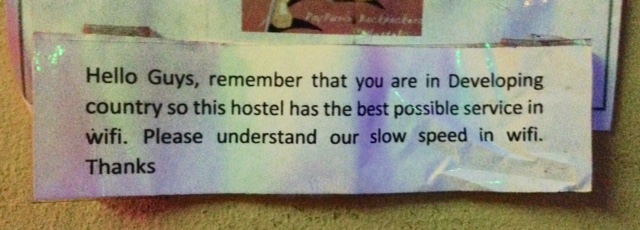School is closed this week for a much needed vacation and therefore the final stage of the Liquid Legacy Project is on hold until next week.
I’m currently flying to Peru and miles above the clouds reflecting on the project. I hope I can share some advice for people thinking about taking part in the Greenheart Grant Program.
There are Three Main Points to Consider
Firstly, the needs of your host community.
There are so many projects that can help communities in developing countries, which one do you choose.
Once I had hit my first 100 volunteering hours I spoke to other volunteers and students and teachers at my schools to gather some ideas. Two months previous we had held a volunteer painting day to paint a wing of the school. So that was first idea that came to mind.
Why not paint the whole school? Get the students involved and it will be cultural exchange galore. We have volunteers from all over the world and some students have never left the city – perfect. But what happens when it gets to the really hot season and the humidity peels it off the walls? It will make the school look lovely but how will it actually benefit the students and the local community?
It would be so much fun, but it just wasn’t a sustainable or beneficial idea. On the other hand, the Liquid Legacy Project will provide clean drinking water to thousands of students and families for years to come. Projects can be fun but they must be sustainable and benefit your host community.
Secondly and simply – it aint easy!
Managing such an important project in a developing country is an epically worthwhile commitment. However, if you think it is going to be a walk in the park, you’re walking the wrong way.
In any country, project management is no easy task and it is more difficult in a developing country. That is exactly what the country is trying to do. Develop. With your help.
Due to the development of countries and the importance of such a project, it is a fine balance of patience and gentle motivating. For example, in England you need some tiling done in your school. You sign a contract, the contractor arrives on the designated day and the correct time (most of the time). The tiling is done and you pay via a bank transfer.
In Colombia you invite a guy who you’ve heard is good to take a look at the project to see if he wants to take the job. If he does, you negotiate the price and start date and this inevitably changes several times before, during and after your tiling needs doing.
If not, you ask around for some else that can do it. Imagine this job was the foundation of all the steps of your project. Without this guy finishing his job you can’t start the next stage. Honestly, that is just the way it is.
You can’t change it so don’t stress over it. Build in a extra time for each stage to compensate for this.

(I saw this recently. Exchange the words ‘hostel’ for ‘country’ and ‘wifi’ for ’tiling’ or any other job in your project.)
Finally, expect everything.
This project started of easy because we had a volunteer project manager who spoke both English and Spanish. He was going to contact the different labourers, order the different parts and check everything happened on time. But he was offered another opportunity and had to leave the city.
Meanwhile, the project has already been awarded the money and my Spanish is no bueno. Panic sets in. I suspect that is why the application process asks for a team of people to support the project for when major predicaments like this one occur.
I’m currently working my 40 hour teaching contract and project managing the Liquid Legacy Project in another language!  Boy will it be worth it when it’s finish though. Not only does the community receive their much needed water filtration system, but what an experience to boast about at an interview.
Boy will it be worth it when it’s finish though. Not only does the community receive their much needed water filtration system, but what an experience to boast about at an interview.
I guess a sub-point from this is if it does hit the fan, use the local community and your team to help. They want it as much as you do. You are not alone.
To summarise:
- Think about the needs of your host community.
- It isn’t easy but it’s worth it.
- Expect everything and use your team when you need help.
I am fully supportive of everyone wanting to make a positive impact. Just bare in mind that as much as it will be rewarding, it will also be challenging.
Hannah Gwynne is a Greenheart Travel English teacher in Colombia and a 2015 Greenheart Club Grant winner for her Liquid Legacy clean water project proposal to provide students access to clean drinking water in their school.
Leave a Reply